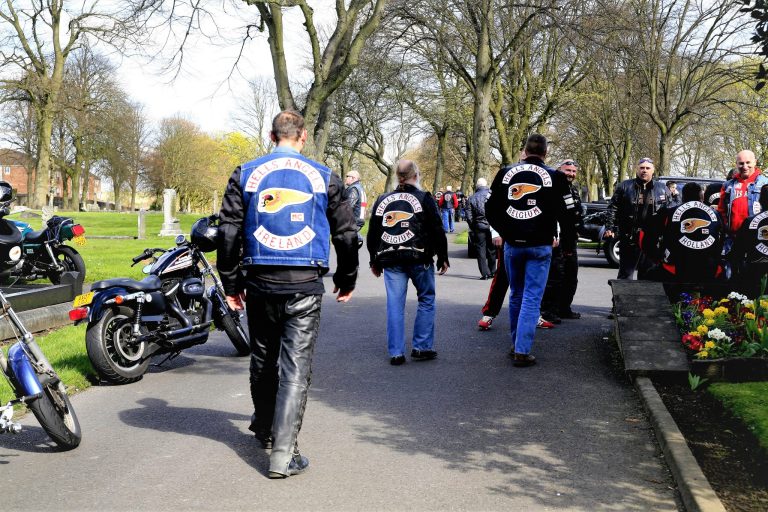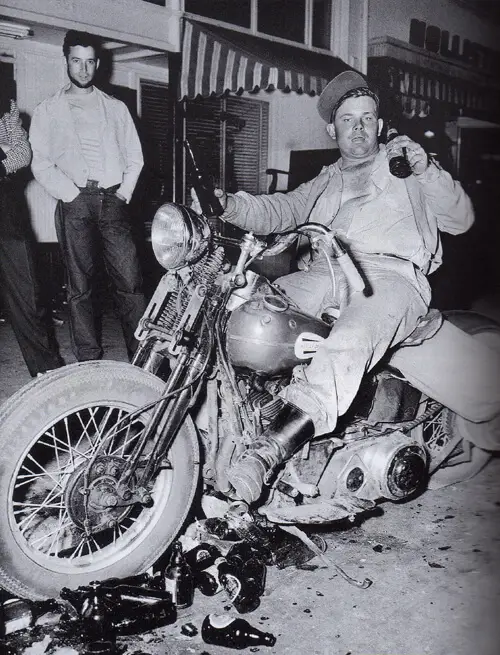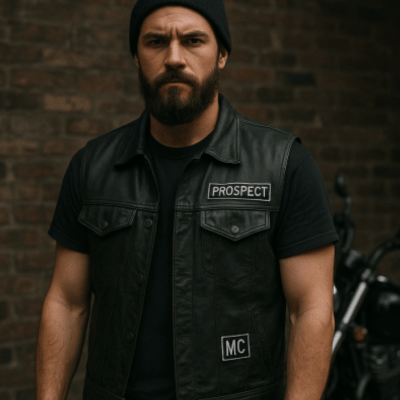Firstly, we would never say what the clubs do and don’t need; that is for the clubs to decide on an individual basis, and we don’t believe in all that bro-marketing nonsense. But unfortunately, scenarios like the one I am about to describe are becoming all too common, and club members are serving sentences longer than they should, having to deal with extreme profiling and monitoring, and other restrictions because of new laws being made that treat them as organized crime groups. Picture it, you’re out with your boys, you get into a bar brawl, no one gets seriously hurt, but now, because you were wearing your colours, the prosecution is calling you to trial as a group and adding RICO charges.
Now the odds are stacked, the club is evoking the legendary silence that has been its line of defence since forever, meanwhile, you, your boys, and the club are getting your reputations trashed, by media outlets that poorly researched the incident, or worse, doctored the footage into a short that makes it seem like it’s something it’s not, then there’s the clickbait sensationalising protocol, news and niche channels all putting there two cents in despite the silence, making the whole thing worse. There is no line of defence between you, the club, and the lawyers, and the potential jail time is stacking up. Here’s the point, there could be!
Let’s face it, it’s the favourite play, right now, label clubs as a gang (meaning an organized criminal gang, then try individuals as a group to apply RICO or similar charges. Allowing extensions, but in some cases, that gang classification was given on historical grounds, which raises questions about whether the individuals it was applied against were actually members during all the historical incidents that contributed to the gang status, or whether the current crime fits the profile of organized criminal activity. The United Nations Office on Drugs and Crime states this.
“Organized crime is a continuing criminal enterprise that rationally works to profit from illicit activities that are often in great public demand. Its continuing existence is maintained through corruption of public officials and the use of intimidation, threats, or force to protect its operations.”
But it is generally accepted that the following need to apply, exclusively planned, rational acts that reflect the effort of groups of individuals. We believe that in order for the trial of club members as a group, there needs to be evidence that the hierarchy was involved in the planning of that activity, which is not usually the case for random bar brawls, traffic offences, etc.
This is just one of the reasons the concept of The Association of One Percenters was formed, as a firewall between the clubs as organizations and the legal and political spaces and activities, as a professional body that can ask these questions, as advocates, that can work with lawyers, lawmakers, and other professionals without putting you and your club’s reputation on blast.
Misrepresentation and Hostility Toward Clubs
This isn’t a new situation, although it does seem to be picking up momentum at the moment. Let’s dive into a historical overview of how outlaw clubs have been portrayed in mainstream media and politics.
The very early riding and racing clubs, we talking early 1900’s seem to be the only ones that escaped the misrepresentations, in 1940’s as clubs flourished with veterans coming home from war looking for camaraderie, loyalty and rebellion they were soon labelled as troublemakers by authorities, next came Hollister 1947 a rally has issues due to large numbers and the local papers and Life Magazine are calling it drunken chaos, publishing a staged photo using it to label bikers dangerous outlaws and a menace to society.
In 1950, Hollywood took over with The Wild One starring Marlon Brandon, setting the template for the dangerous wandering rebel, leather jackets, lawlessness, and violence (if you’re wondering where the problem with the biker aesthetic starts, this is it.
1960s – the panic really sets in (the beginning of all that public anxiety). We want to note this at every point when the misrepresentation intensified, it correlates with a direct increase in numbers, at this point clubs are growing rapidly and craving out strong identities for themselves, and the authorities switch to treating clubs as criminal gangs rather than cultural groups. Not helped by the Hell’s Angel book by Hunter S Thompson (1966).
The 1970s were the era of the gang label, and authorities began attacking clubs under organized crime initiatives. News outlets now completely shift from freedom and rebellion to violence and crime, and distinctions between clubs are ignored; now they are all lumped together. Clubs are monitored, profiled, and subject to increasing public stigma.
In the 1980’s the sensationalism hit the throttle. Movies and TV are perpetuating the stereotypes and begin portraying clubs as drug-running gangs, law enforcement begins crackdowns, sometimes fuelled by media, not reality. Outlaw clubs are portrayed as chaotic, leaving behind structure and traditions.
The 1990s saw authorities classifying more clubs as criminal syndicate gangs, the media began using the labels without question, and clubs were demonized even in situations when maybe it was the actions of an individual.
It’s the 2000s, and the culture is being warped yet again. TV shows like Gangland, Sons of Anarchy, and later Mayans, portray a violent gang-style soap opera. While they do do research, they still get some stuff wrong. Outsiders now believe these representations are real, and clubs modelled after the ones in the shows start to appear. Profiling and monitoring, raids, and discrimination by the authorities increase during this time. The public is fascinated with this TV version of what an outlaw club is.
In 2010, tragedies like the WACA shooting became defining moments for the press, who continue to emphasize violence and turf wars, and clubs begin receiving harsher treatment, blanket profiling, and collective punishments. While social media drowns out authentic voices by pushing stereotypes.
Bringing us to today, 2020’s clubs remain misrepresented despite charity and community work, the media rarely shows the human side of families, and tradition. Challenges increase cultural annihilation, digital surveillance, and online stigma. The good news is that the culture is starting to push back and claim its voice.
The problem with the stigma is that it translates into legal consequences. Look at the Australian laws; they wrote laws to tear apart outlaw club culture, describing it as the power they now have over clubs, while writing in exceptions for the indigenous tribunal community. The problem with all this is that clubs have a strong internal structure but are limited in professional representation in political/legal/media systems, and the organizations like NCOM, AMA, etc, that do exist often require clubs to be publicly declared as members to stand in a room, further subjecting them to stigma. We believe clubs need a choice. Having a voice shouldn’t mean exposure to further stigma.
What Is GAOP?
The Global Association of One Percenters, is a division of Kutte Kulture LTD, and is our advocacy arm, founded in 2025 by Belinda Sharland, aka Wildcard, our mission is simple to Serve as a professional firewall between outlaw motorcycle clubs (MCs) and the political/legal system to protect members from profiling, stigma, and hostile legislation while providing a credible collective voice.
Belinda built the association on the same values she had been embodying for years, club first, always – always working in the best interest of the club is a common thread that binds us all. Belinda’s methodology of you come for one of us, you come for all of us is embodied in this value. Loyalty & authenticity, we are 100% loyal to our members and operate in complete authenticity. This is the reason people work with Belinda.
Adventurous and bold, we are not afraid to tackle the big issues, and we will always give it to you straight. Freedom, rebellion, and fair representation are the values that drive us forward towards a world where outlaw bikers, their families, and communities are free from stigma, profiling, and unfair legal practices, with rights respected and voices represented.
We are your firewall, absorbing the heat from the outside world so clubs can focus on what matters. We put the choice back in the club’s hands on how exposed they want to be when having a voice on political, legal, and media matters. We do this through a variety of ways, from early warnings on new legislation to curated press releases published in our name but approved by you (although no one needs to know that) to legal and political advocacy. We are not a club; we are an organization that exists to protect, represent, and advocate for clubs. We are just getting started and are currently led by our founder and director of Kutte Kulture LTD, Belinda Sharland. We have plans to have a volunteer board of 6 people, which will begin recruiting shortly. The board is an advisory board that will guide the direction of the company and its activities. While Belinda’s decision will be final, it is hoped that the board’s majority will be followed; only in cases of a lack of majority will Belinda make a final decision.
The Firewall Framework in Action
Our Firewall framework sets us apart from other organisations, and our club’s first focus.
We have 5 stages that are implemented across the business. Each of the 5 stages has a 6-step process.
- Filter: We collect and vet legal/policy/media threats that affect outlaw clubs. One step in the process is via incident report forms; clubs can anonymously report incidents using an end-to-end encryption form that links to an end-to-end encrypted email address. We take your privacy seriously. This stage also includes incident vetting and early alerts.
- Shield: This stage includes Risk management strategies to keep clubs insulated and anonymous. Clubs can choose from the following levels of exposure: Silent Shield, Advisory Voice, or Public Ally. Clubs can also access Pre-drafted press/legal statements to protect clubs and their reputations if targeted.
- Translate: We begin to convert club concerns into professional legal/policy language that outsiders respect. We write on policy that affects outlaw clubs while always maintaining the integrity of the outlaw clubs we serve.
- Advocate: We Lobby, take legal actions, and run campaigns to defend outlaw clubs in hostile environments. Where possible, provide legal support.
- Amplify: through annual events, outreach workshops, and training, as well as Grim Rider magazine, we amplify the impact of our work to strengthen the identity and culture of outlaw motorcycle clubs.
Why GAOP Matters to Clubs
For decades, outlaw motorcycle clubs have faced shifting political winds, sudden changes in legislation, and constant public suspicion. Too often, these threats arrive without warning, leaving clubs scrambling to respond after the damage is already done. GAOP exists to break that cycle. By functioning as an early-warning system, it keeps member clubs ahead of legal and political risks.
Whether it’s a new profiling bill, a police crackdown in a city, or international trends in organised crime laws, GAOP monitors the landscape and delivers clear updates in time for clubs to prepare, adapt, and respond. No more guessing, no more being blindsided, GAOP provides foresight where once there was only reaction.
But GAOP is more than information. It offers a pooled defense, strength in numbers without sacrificing the secrecy and independence that define outlaw culture. Individual clubs fighting battles alone are easy targets; united under the GAOP firewall, those same clubs gain collective leverage.
Their experiences, incidents, and concerns are aggregated, filtered, and translated into advocacy goals that carry real weight. This allows GAOP to press for changes in law, policy, and perception while keeping the raw details of each club confidential. The power of many fuels the defense of all.
Stigma remains one of the biggest threats outlaw clubs face. Decades of media distortion and political scapegoating have painted clubs with a single brush: gangs rather than brotherhoods, criminals rather than communities.
GAOP tackles that stigma directly by managing public perception. Through media responses, cultural platforms like Grim Rider Magazine, and carefully crafted communications, it creates a protective buffer between clubs and the outside world.
Instead of being trapped in someone else’s narrative, clubs gain the chance to have their victories celebrated, their voices heard, and their culture respected.
At the core of all this is confidentiality. GAOP was built to absorb exposure so that clubs can maintain their privacy intact. Member organisations can choose how visible they want to be, completely silent, advisory, or openly allied, while GAOP handles the external battles. The structure ensures that clubs benefit from advocacy without compromising their independence or security.
In short, GAOP matters because it gives outlaw motorcycle clubs what they have never had before: a shield that sees threats coming, amplifies their collective strength, challenges stigma head-on, and protects their privacy while doing it.
Amplify: Culture as a Line of Defense
GAOP’s work goes beyond courtrooms and legislative halls. The fight for outlaw motorcycle clubs is not only legal and political, it is cultural. For decades, the image of the one-percenter has been shaped by outsiders: law enforcement press releases, sensationalist news stories, and television stereotypes. This constant drip of misrepresentation has created stigma, making it easier for lawmakers to pass hostile laws and for police to justify profiling. If culture is where the attacks begin, then culture must also be part of the defense.
That is why GAOP created Grim Rider Magazine, the flagship project of its Amplify function. Grim Rider exists to retake the narrative, to tell the story of outlaw motorcycle culture in its own voice. It celebrates victories, shares knowledge about rights, and showcases the brotherhood and traditions that mainstream media ignores. By amplifying pride and resilience, Grim Rider reshapes how the world sees outlaw clubs, turning moments of resistance into cultural strength.
Identity and representation are more than image; they are a line of long-term protection. When clubs are seen only through the lens of criminalisation, every new law or raid is easier to justify. But when outlaw culture is framed as community, heritage, and resistance, the ground shifts. Public opinion hardens against overreach, allies begin to listen, and younger riders inherit a story that is about dignity rather than stigma.
Through Grim Rider and other cultural projects, from annual conferences and picnics to workshops that teach media strategy, GAOP ensures that outlaw motorcycle clubs are not just defended, but represented. Culture becomes a shield in its own right, one that guards against erasure and builds a legacy for the future.
Membership: How Clubs Engage with GAOP
Membership in GAOP is built around one principle: trust through privacy. From the first contact, clubs enter a secure, confidential onboarding process. Communication is encrypted, agreements are locked down by NDAs, and clubs remain in control of their own exposure level. Whether a club chooses to stay completely anonymous or step forward as a public ally, GAOP ensures that the firewall between the outside world and the clubhouse never breaks.
What do clubs gain? First, early forecasts of legal and policy risks that would otherwise blindside them. Second, shielding in the public and media space, where GAOP absorbs the heat, so clubs don’t have to. Third, translation of raw concerns into legal and political briefs that lawmakers, journalists, and courts will actually take seriously. And finally, direct advocacy at the highest levels, where GAOP pushes for laws and policies that protect, rather than criminalise, outlaw riders.
Membership also brings incentives beyond protection: low exposure, cultural credibility, and tangible security. Clubs don’t give up independence; they gain a powerful ally that exists only to strengthen their position. GAOP is not a replacement for club structures, nor does it interfere in club politics. It is an external shield, built to complement what clubs already do best: ride, live free, and look after their own.
Future Vision for Clubs
Imagine a future where outlaw motorcycle clubs are no longer treated as gangs by default, where wearing colours is an expression of culture, not a trigger for harassment. A future where laws are shaped by evidence, not prejudice, and where the voices of clubs carry weight in the same institutions that once ignored them.
GAOP exists to build that future. As a permanent firewall, it protects against unfair laws, biased narratives, and political overreach. More than that, it strengthens outlaw culture’s survival and sovereignty, ensuring that clubs can pass down their legacy without compromise. The road ahead is clear: outlaw clubs deserve freedom, dignity, and respect, and GAOP is here to secure it.



